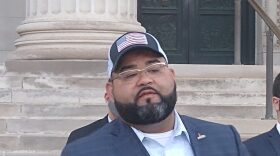An organization devoted to coordinating organ donations throughout New England is encouraging locals in western Massachusetts to be donors themselves – trying to boost registration numbers that appear to lag behind other parts of the Northeast.
A massive billboard off I-291, social media, and events with the mayor have all been part of New England Donor Services’s push to convince more residents in the Springfield-area to sign up as organ donors.
One of the more recent additions, the billboard in East Springfield, calls for residents to “Be a hero – be an organ donor,” and is expected to stay up through the summer.
According to Matt Boger, the group’s Director of Government Relations, NEDS is already coming off a record month for donations.
The federally designated “Organ Procurement Organization” says in June, it coordinated a record-breaking 64 organ donors that led to 154 organs being made available for transplant.
“Registering as an organ donor is a true gift of hope and true gift of life - that heart is a great symbol because that means that you have a heart that you're thinking of other individuals,” Boger said.
Speaking with WAMC, Boger referred to the small heart symbol added to a driver’s license when you sign up to be an organ and tissue donor at the Registry of Motor Vehicles.
According to Boger, the RMV is where 98 percent of sign-ups occur. It’s also where he says data showing a lag in donor sign-ups is appearing.
“Massachusetts, right now, is lagging behind the nation, so, it is our effort, on a national-level, to get at least 50 percent of the American population registered as organ donors,” he said.
“Massachusetts, had strongly been about 51 percent or 50 percent people registered. Over the past couple years, we've seen a little decline and we're about 48 percent now, and we want to really make sure that people realize the importance of registering, the idea of hope. And in Springfield, it's closer to around 40 percent.”
For context, Maine appears to lead New England with around 58 percent, followed by Vermont with about 56, and New Hampshire at 55. Rhode Island (“about 46 percent”) and Connecticut (45 percent) are also underperforming.
Getting to the root of the lower figures has been an ongoing effort, Boger says, as are efforts to encourage residents in Springfield directly.
“I just ask each and every one of you, God forbid, but if something does happen - get that heart on your license, and you'll be able to help out an individual, help out their family, to continue to have their loved one around” Sarno said at city hall during an organ donation awareness event earlier in the month.
The mayor, a registered donor, spoke alongside others on July 17 to highlight the billboards and the stories of donors themselves.
Massachusetts State Senator Adam Gomez of the Hampden district detailed his own experience receiving a donation. During the pandemic, Gomez says he contracted COVID and went on to lose kidney function, leaving him in need of emergency dialysis.
Going on dialysis for months, he says, he was able to obtain a transplant and for a year now, has been improving drastically. He says it’s progress made possible by the selflessness of a donor and their family – as are many other donations.
“We know that we have families here that – they made the ultimate sacrifice and had to make the hard decision, but, in dark times, they saved not one life, but a multitude of lives,” he said. “When … we're an organ donor - or a family that understands what Donate Life is about, you save a multitude of people's lives in different ways.”
Hal Etkin, a former assistant district attorney and former director of the Western Massachusetts Police Academy, received a heart transplant after experiencing heart failure that started in 2014.
He says the life-saving transplant was made possible by a 26-year-old from Plymouth named Jack Teehan. Prior to his death, Teehan had signed up to be a donor – a decision that led to Etkin’s recovery and others as well, thanks to Teehan’s liver and kidneys.
“All of us want to make a difference, want to make life better for others, and this is a simple act,” he said. “You probably will never be touched by it, but just going to the registry and signing up can make all the difference in the world for someone else.”
Boger says when residents decline to be donors, one common reason he hears is age.
He says that regardless of your age, a donation such as a kidney can still make a significant difference, especially when many on the waiting list for a donation are seriously ill.
“You can register [at] 60, 70, 80, 90,” Boger said. “We did have a case where an individual received a kidney in their 80s, and that's a wonderful gift…. there are many cases where there's a 20-, or 30-, or 40-year-old who received a kidney from someone in their 60s.”
According to Boger, in New England alone, there are some 6,000 people waiting for transplants of some kind, whether it be a heart, lung, liver, pancreas, or kidney.




